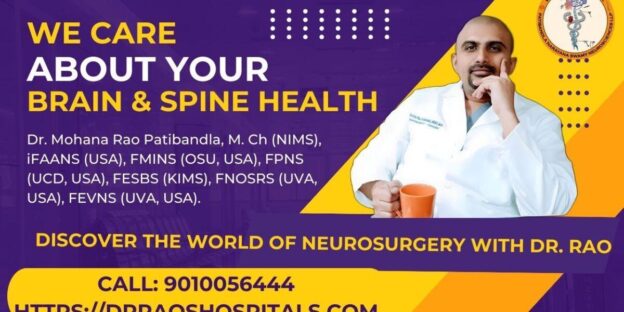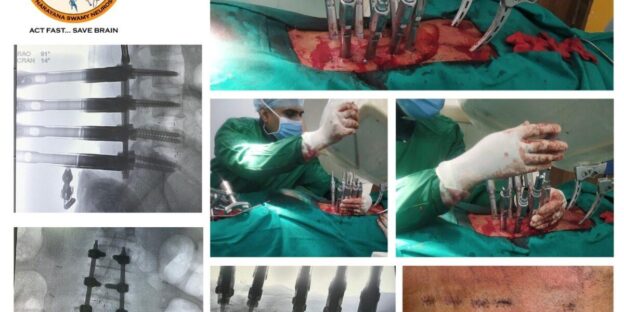Explore the World of Neurosurgery with Dr. Rao, the Best Neurosurgeon in India | Dr. Rao’s Hospital
Summary:
This comprehensive guide will take you on a visual tour of neurosurgery, shedding light on its fundamental principles and procedures. Join Dr. Rao, the leading neurosurgeon in India, as we explore the remarkable advancements in neurosurgical techniques and the exceptional care provided at Dr. Rao’s Hospital in Guntur. Whether you’re curious about the intricacies of brain and spine surgeries or want to understand the dedication and precision required in this specialized field, this visual guide will provide valuable insights.
Introduction:
Neurosurgery is a specialized field of medicine that focuses on diagnosing and treating disorders affecting the brain, spine, and nervous system. It requires exceptional skill, precision, and dedication to provide patients with the best possible outcomes. In this visual guide, we invite you to join Dr. Rao, the best neurosurgeon in India, on a journey to understand the basics of neurosurgery and the remarkable advancements in this field.
I. What is Neurosurgery?
Neurosurgery involves surgical interventions on the brain, spine, and nerves to diagnose and treat various conditions. It aims to alleviate pain, restore function, and improve the quality of life for patients. With Dr. Rao as our guide, we will explore neurosurgical procedures’ intricacies and their critical role in addressing neurological disorders.
II. Meet Dr. Rao: The Best Neurosurgeon in India Dr. Rao,
renowned for his expertise and commitment to patient care, is considered the best neurosurgeon in India. With years of experience and a passion for innovation, Dr. Rao has performed numerous successful surgeries, earning him a reputation for excellence in the field. Learn about his journey, accomplishments, and the exceptional team at Dr. Rao’s Hospital in Guntur.
III. Advancements in Neurosurgical Techniques
In recent years, neurosurgery has witnessed remarkable advancements in techniques and technology. We will delve into minimally invasive procedures, which offer benefits such as reduced trauma, faster recovery, and improved patient outcomes. Discover how Dr. Rao and his team utilize these techniques to provide state-of-the-art neurosurgical care.
IV. The Remarkable Care at Dr. Rao’s Hospital
At Dr. Rao’s Hospital in Guntur, patients receive comprehensive care and personalized treatment plans. Dr. Rao and his team prioritize patient well-being and provide individualized care throughout the neurosurgical journey. From preoperative assessments to postoperative rehabilitation, Dr. Rao’s Hospital ensures patients receive the greatest attention and support.
V. Common Neurosurgical Procedures
Explore the most common neurosurgical procedures performed at Dr. Rao’s Hospital. From brain surgeries like tumor removal, aneurysm clipping, and epilepsy surgery to spine interventions such as spinal fusion, discectomy, and spinal tumor removal, we will walk you through these essential procedures. Understand the purpose, techniques, and potential benefits of each surgery.
VI. The Role of Neurosurgery
in Restoring Lives Neurosurgery profoundly impacts patients’ lives, often providing a new lease on life. We will share heartwarming stories of individuals who have benefited from neurosurgical interventions at Dr. Rao’s Hospital. Witness the transformative power of neurosurgery in restoring hope, function, and quality of life.
VII. The Future of Neurosurgery
As technology advances, the future holds immense promise. Dr. Rao and his team are at the forefront of integrating cutting-edge techniques and technologies, such as artificial intelligence and robotic-assisted surgery, into their practice. Discover how these innovations are revolutionizing the field and improving patient outcomes.
Conclusion:
Neurosurgery is a fascinating field that combines scientific knowledge, technical expertise, and compassionate care. With Dr. Rao, the best neurosurgeon in India, leading the way, patients at Dr. Rao’s Hospital in Guntur receive exceptional neurosurgical care. Whether you’re seeking to expand your knowledge or considering neurosurgery for yourself or a loved one, this visual guide has provided valuable insights into the world of neurosurgery and the remarkable work being done to restore health and happiness.
To learn more about Dr. Rao, the best neurosurgeon in India, and the exceptional neurosurgical services at Dr. Rao’s Hospital, visit our website at drraoshospitals or call 9010056444.
Tags: Neurosurgery, Dr. Rao, Best Neurosurgeon, India, Dr. Rao’s Hospital, Guntur, Brain Surgery, Spine Surgery, Surgical Precision, Patient Care, Medical Procedures, Visual Guide, Surgical Techniques, Medical Advancements, Neurosurgical Expertise


